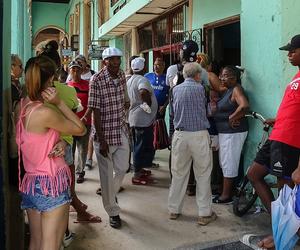Shortage in Santiago de Cuba: "Gentlemen, it's over!"
- Submitted by: admin
- Santiago de Cuba
- Society
- 03 / 04 / 2019

Norma, who is now 86 years old, this morning went out to scrutinize the shops of Santiago de Cuba, hoping to buy some "salting", a term used by the people of Santiago, referring to meat and other protein-rich foods.
But to the disappointment of the octogenarian lady, who after spending hours at the bus stop waiting for a bus and then travel the city, already with sore feet, this time did not find what to take home.
He says that in his long journey he could only see empty refrigerators and formidable tails, which dissipated the instant one of the vendors shouted loudly and at the same time reflecting weariness in his voice, "Gentlemen, it's over!", Meanwhile the from the line, they grumbled.
"There is nothing and if one manages to get some chicken or meat, send yourself running to get the oil, at home we have been using egg and lard for more than a week," Norma says.
Later, he reproached, "but that's not all, I have cholesterol problems and I can not be eating so much fat for other health problems. The doctor took all that from the diet, although what the doctor does not know or does not understand, is that, in Cuba, there is no choice, "he added while showing his bag, empty.
The shortage in Santiago de Cuba becomes the most mentioned subject in the conversations and the murmurs in corridors, stops and even in the public transport of the city, "there is no chicken and the oil is gone, the only thing that there is picadillo de res and turkey, it's better to eat a carton than that. Neither the egg gives signs of life, you really have to do magic to eat, "said a gentleman in the bus route 36.
To the compass of the gentleman, the subject in the guagua ran from mouth to mouth and in a point everybody followed the rhyme like a popular musical subject, repeated and sticky.
"They already saw the prices of the vegetables that they took out in the Siglo XX store, they are for laughing," adds a lady, who was squeezed in the end of the bus without hardly noticing in the crowd.
Meanwhile, a young man with a telephone in his hand and a peculiar Emo style, added, "do not talk, we are continuity." Almost automatically, the short but ironic comment was cause for laughter for some passengers on public transport.
However, the luxuries of the Foreign Currency Collection Stores (TRD) and the exorbitant prices of the products offered, which are looked at, but not touched, are present, although these make the senses delirious and maintain the dilemma between the need and what is attainable
Asparagus at 11.15 CUC per kilogram and 200 grams of smoked salmon at 21.15 CUC, are some of the oddities offered by these days, in the TRD Siglo XX, which are shown on a poster with enlarged letters, but which in the eyes of the Cubans on foot, these amounts constitute an absurd and shameful joke.
In the same way other stores in the city of Santiago, also leave the salary reality of the average worker in Cuba, which barely reaches 30 CUC per month, not counting the 8 CUC that most retirees receive and welfare cases.
The Dragon store is no exception. It keeps all its refrigerators depleted and only reach to display cheeses that exceed 25.00 CUC per kilo, Bravo ham tubes at 7.25 CUC per kilogram and the shelves only have packages of Maria cookies, at 3.25 CUC.
A girl who was in the aforementioned shop, repeatedly pulled her mother's arm and yelled, "Mom, buy me cookies, those are the ones I want", while tearfully pointing to where they were some packages of cookies, with striking colors. But the other mother, pretended not to hear the tearing of her little girl and only answered: "Shut up there is no money for that".
The stage where a staging called scarcity is displayed, a work that nobody wants to attend, but that imposes its functions on a daily basis and even for all, seems to extend also to the private sector, being this in many ways a salvation to scarcity state, although with prices also high, manages to keep with better offers than state markets.
Comments